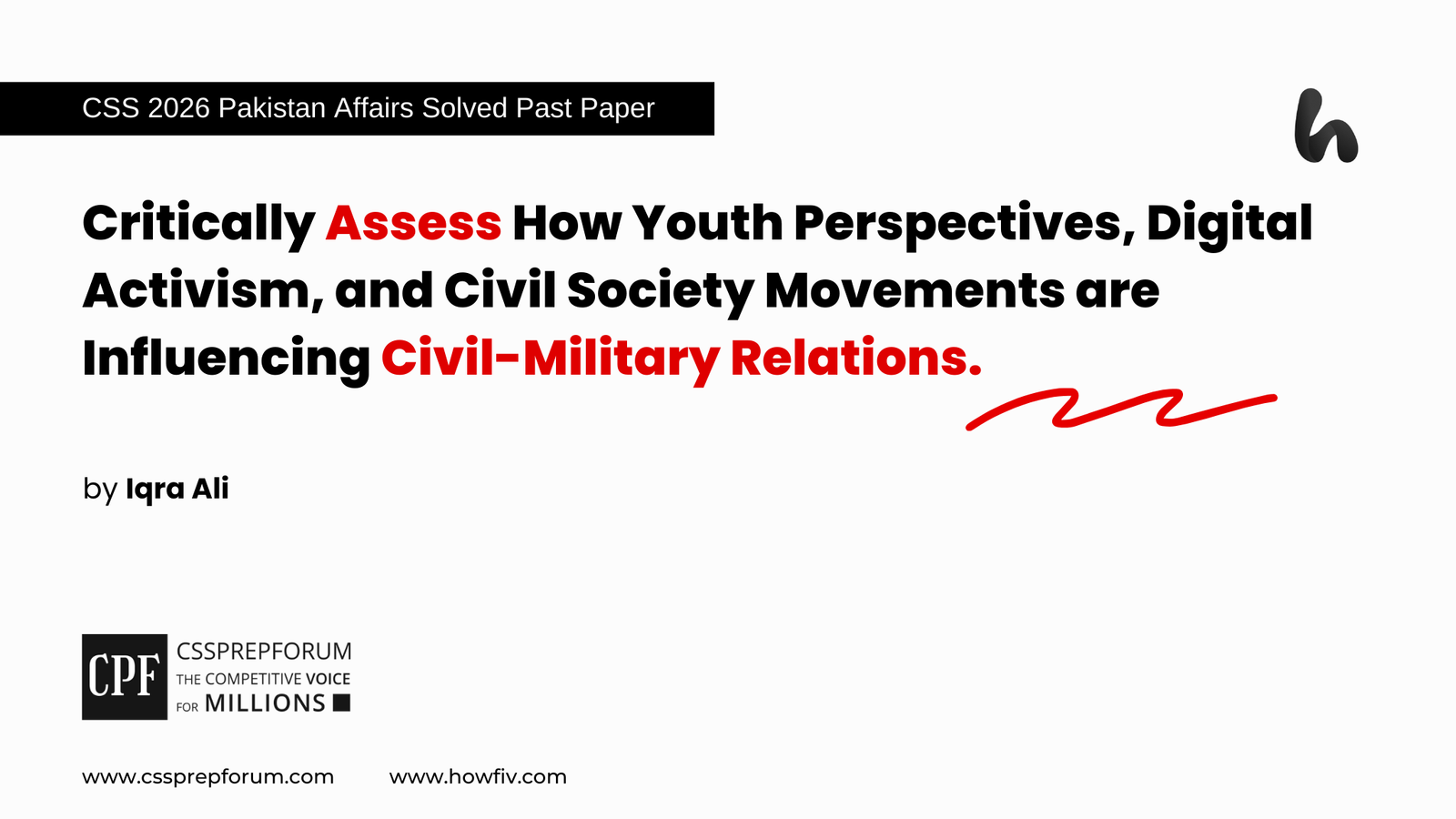Impacts of Overpopulation in Pakistan | Daily Writeup | Opinions
The following article, “What are the Impacts of Overpopulation in Pakistan?“, is written by Mahad Zulfiqar, a student of Sir Syed Kazim Ali. Moreover, the article is written on the same pattern, taught by Sir to his students, scoring the highest marks in compulsory subjects for years. Sir Kazim has uploaded his students’ solved past paper questions so other thousands of aspirants can understand how to crack a topic or question, how to write relevantly, what coherence is, and how to include and connect ideas, opinions, and suggestions to score the maximum.

In the complex web of global issues, the overarching problem of overpopulation emerges as a looming catastrophe, affecting the sustainability of developing nations specifically. With a rise in population, Pakistan, an agrarian developing country, is at a critical juncture, facing multifaceted challenges across social, economic, and environmental dimensions. The rapid growth rate brings a series of impacts beyond demography, impacting the nation’s overall well-being. Woefully, the country’s education sector struggles with the effects of a growing population, leading to a significant impact on its literacy rate. Further, limited healthcare access, particularly in marginalized regions, magnifies Pakistan’s health-related challenges linked to uncontrolled population increase. Additionally, urbanization, especially in Karachi, Pakistan’s most populous city, illustrates the strain on its infrastructure and the environment, with severe water scarcity and pollution hindering its sustainable development. A 2023 World Wildlife Fund report draws attention to the Indus Delta’s 40% shrinkage in the past 40 years, attributed to water diversion and sea levels rise, intensifying concerns about resource depletion and food security. As youth unemployment stands at 24% as of 2023, the economic and social ramifications become stark, fuelling resentment and hindering prosperity. Considering this situation, potential solutions, such as enhancing human capital, adopting resource-efficient practices, and strengthening family planning, become crucial. This article will discuss the impacts of overpopulation in Pakistan and the avenues for the country’s sustainable progress.

Before analyzing that why addressing the issue has become a matter of discussion, it is necessary to analyze the brief overview of the issue in Pakistan. Verily, the country faces a critical dilemma in dealing with its rapidly growing population. With around 232 million people and an annual growth rate of about 1.9%, it is among the world’s most populous nations, doubling the global average. This fast growth puts immense pressure on resources, and projections hint at reaching 263 million residents by 2030, worsening existing inequalities. Hence, urgent attention is needed, especially when youth unemployment stands at 29% with education struggles and environmental issues. Hence, Pakistan’s demographic challenges are complex, demanding immediate and comprehensive solutions, affecting every aspect of society and shaping its future.
Before discussing the main maxim, the significance of addressing overpopulation is crucial, as it disturbs the sustainability of the country and stability of society. Undoubtedly, the over-exceeding number of people strain resources, leading to water scarcity, food insecurity, and unemployment. However, manageable population growth ensures better access to education and job opportunities. This, in turn, fosters social and economic stability. So, ignoring overpopulation is like neglecting a growing breach in a dam, exacerbating existing inequalities and hindering progress. In essence, acknowledging and acting on this demographic tide is pivotal for creating a sustainable future where everyone has a chance to thrive.
Talking about the impacts of overpopulation in Pakistan, the first one is related to education dilemma. Verily, Pakistan tackles a challenging education landscape, illuminated in a 2022 UNESCO report exposing a mere 58% literacy rate, the lowest in South Asia. The education sector contends with overcrowded classrooms, insufficient resources, and alarming dropout rates, compromising the quality of education. This scenario is intensified by inadequate facilities to accommodate the escalating student population. These systemic issues underscore the urgent need for comprehensive reforms to break the cycle of illiteracy. Therefore, balancing resources and enhancing infrastructure are pivotal steps towards achieving a robust educational environment in Pakistan.
Moreover, the healthcare infrastructure in some areas of Pakistan grapples with strain, marked by limited access to basic facilities and heightened vulnerability to epidemics and infectious diseases. The World Health Organisation (WHO) report provides stark evidence of this challenge, illuminating the disparities in healthcare accessibility. Insufficient resources and infrastructure has worsened the situation, leaving communities at risk. Hence, urgent interventions are imperative to address these disparities and strengthen healthcare systems, ensuring that essential facilities are universally accessible. Furthermore, a concerted effort is required to safeguard public health, particularly in underprivileged regions.
Additionally, unchecked urban sprawl poses severe adversities, fostering slums, poverty, and strained resources, especially water and electricity. Rapid urbanization in Karachi, Pakistan’s most populous city, results in severe water scarcity and pollution, impeding sustainable development. Overpopulation amplifies the strain on infrastructure and creates a domino effect of socio-economic issues. Addressing this complex interplay is crucial to fostering balanced urban growth, ensuring that cities like Karachi can sustainably accommodate their burgeoning populations while providing essential services for residents’ well-being and the overall advancement of the community.
Furthermore, the overexploitation of natural resources in Pakistan, particularly water and land, severely threatens food security and agricultural productivity. A 2023 World Wildlife Fund (WWF) report emphasizes this, revealing a 40% shrinkage in the Indus Delta over the past four decades. This decline is mainly attributed to water diversion for agriculture and the impact of rising sea levels. With overpopulation aggravating these challenges, the burden on resources creates a pressing need for sustainable practices. As the population grows, striking a balance between resource utilization and conservation becomes paramount to ensure long-term food security and the well-being of Pakistan’s populace.
Besides resource depletion and food security, the challenge of generating sufficient employment opportunities for Pakistan’s burgeoning and youthful population exacerbates the issues of poverty and income inequality. It is a matter of fact as in 2023, the country’s youth unemployment rate has reached 24%, which indicates economic hurdles and fosters resentment among the younger demographic. This employment gap impedes the nation’s economic prosperity, expanding social disparities. Therefore, addressing the impacts of overpopulation requires strategic interventions in job creation, emphasizing the importance of equipping the growing workforce with opportunities to alleviate poverty and promote a more inclusive and stable economy.
In addition, the heightened competition for resources in Pakistan serves as a catalyst for social unrest, poverty-driven crime, and extremism. This is evident in regions like Balochistan, where resource scarcity and limited economic opportunities fuel an ongoing insurgency. The lack of sustainable development increases societal tensions and creates an environment conducive to unrest and criminal activities arising from economic desperation. Addressing the implications of overpopulation is essential for mitigating these issues, requiring comprehensive strategies that focus on resource management, equitable economic opportunities, and regional development.
Next, the escalation of carbon footprint, driven by deforestation for fuel and housing, worsens climate change and environmental degradation. A recent United Nations Environment Programme (UNEP) report underscores the global repercussions of expanding populations contributing to deforestation. The report emphasizes the interconnectedness of human activities, particularly the clearing of forests, with the acceleration of environmental harm. As populations grow, the resource demand intensifies, leading to widespread deforestation that significantly impacts ecosystems. While the challenges are evident, the positive takeaway lies in recognizing that informed global initiatives can effectively address the relationship between population growth, deforestation, and environmental well-being. This awareness can guide us toward sustainable practices, ensuring a healthier future for humanity and the planet.
Likewise, the decline of biodiversity and disruption of ecosystem services stand as a pressing concern, driven by encroachments on natural habitats, depletion of wildlife, and the disturbance of crucial ecosystem functions. A striking illustration unfolds along Pakistan’s Indus River, revealing a disconcerting 76% reduction in populations of freshwater fish species since 1975, as documented by the WWF. This alarming trend is primarily attributed to habitat loss and overfishing. The degradation of this vital ecosystem not only affects the rich aquatic biodiversity but jeopardizes the indispensable services it provides. Hence, conservation efforts are indispensable to counter further degradation and preserve the equilibrium of the country’s ecosystems.
However, amidst the challenges posed by overpopulation in Pakistan, there is still room for hope and practical solutions. First, harnessing human capital can make Pakistan’s demographic challenge a formidable advantage. By investing in education, vocational training, and skill development, societies can unlock the full potential of their youth, creating a well-equipped workforce for diverse challenges. This targeted approach uplifts individuals and contributes to overall societal growth. Therefore, fostering human capital development becomes an optimistic catalyst toward an inclusive future.
Second, Pakistan’s future well-being rests not only on navigating population challenges but also on embracing a transformative journey towards sustainability. Therefore, embracing resource-efficient practices and conserving natural resources is crucial. Implementing these measures on both individual and organizational levels contributes to preserving our planet’s precious resources. Small actions, like waste reduction and embracing renewable energy, collectively yield a positive impact.
Finally, strengthening family planning programs and reproductive health education is paramount for societal well-being. Equipping individuals with knowledge and accessible resources empowers them to make informed decisions about their families. This enhances personal well-being and contributes to the overall health and stability of communities. Moreover, addressing shared challenges such as water scarcity and climate change requires a collaborative and unified effort. By fostering global cooperation and sharing resources, nations can collectively develop effective strategies to mitigate the impact of these challenges. This collaborative approach not only enhances the resilience of individual communities but also contributes to the community’s overall well-being.
Examining the situation critically, it is evident that the surging population poses a significant challenge for the Pakistani government. However, it’s crucial to recognize that this crisis is manageable with strategic interventions and thoughtful policies. The severe implications of overpopulation in Pakistan are stressing challenges in education, healthcare, Urbanization, resource depletion, and employment. It highlights uncontrolled growth straining resources, resulting in water scarcity, food insecurity, and unemployment. The solutions proposed include investing in education to harness human capital, adopting resource-efficient practices, and strengthening family planning. These pragmatic measures aim to alleviate the burden on resources and promote sustainable development.
To summarise, the rising population in Pakistan results from a complex interplay of various factors, evolving into a cultural phenomenon over decades. The challenges are vast, impacting education, healthcare and the environment. However, the escalating global awareness of the alarming population growth has finally prompted the Pakistani government to address this issue seriously. The process is lengthy, but achievable goals for the nation’s well-being require comprehensive efforts. The government has to play a central role by creating practical policies and a conducive environment for people to embrace successful population control measures. Consequently, such integrated strategies navigate the nation towards sustainable socio-economic development.

CSS Solved Past Papers’ Essays
Looking for the last ten years of CSS and PMS Solved Essays and want to know how Sir Kazim’s students write and score the highest marks in the essays’ papers? Then, click on the CSS Solved Essays to start reading them.
CSS Solved Essays
CSS Solved General Science & Ability Past Papers
Want to read the last ten years’ General Science & Ability Solved Past Papers to learn how to attempt them and to score high? Let’s click on the link below to read them all freely. All past papers have been solved by Miss Iqra Ali & Dr Nishat Baloch, Pakistan’s top CSS GSA coach having the highest score of their students. General Science & Ability Solved Past Papers











